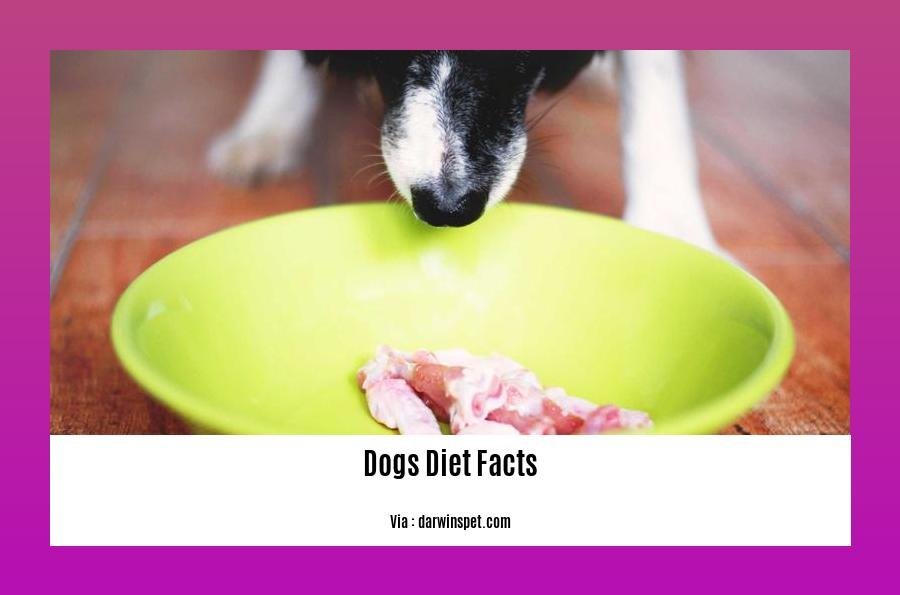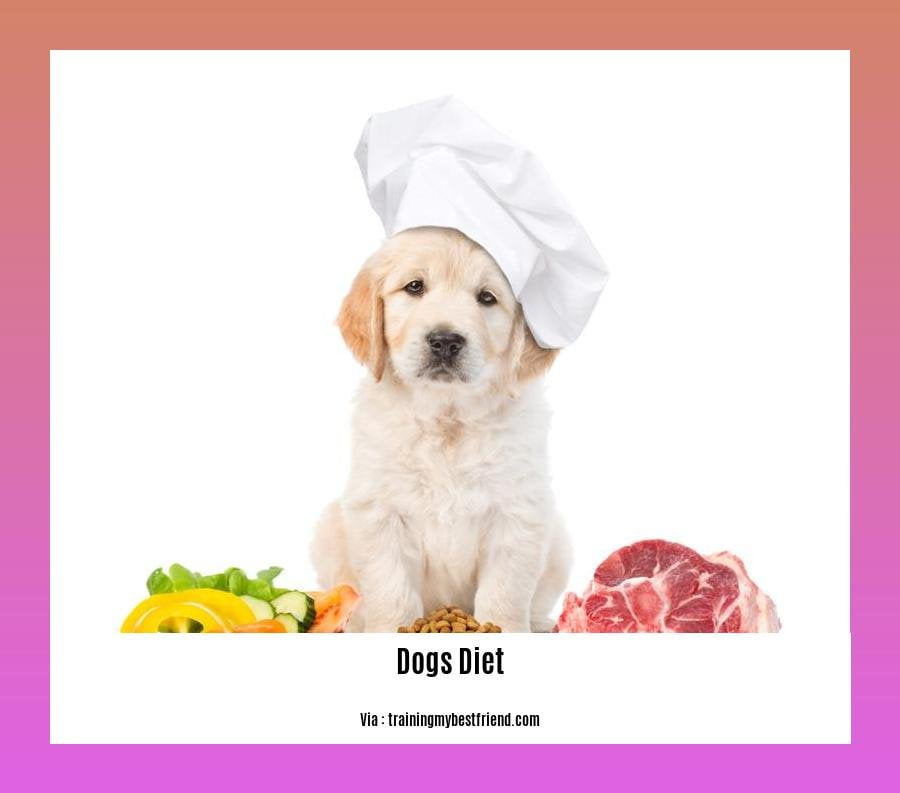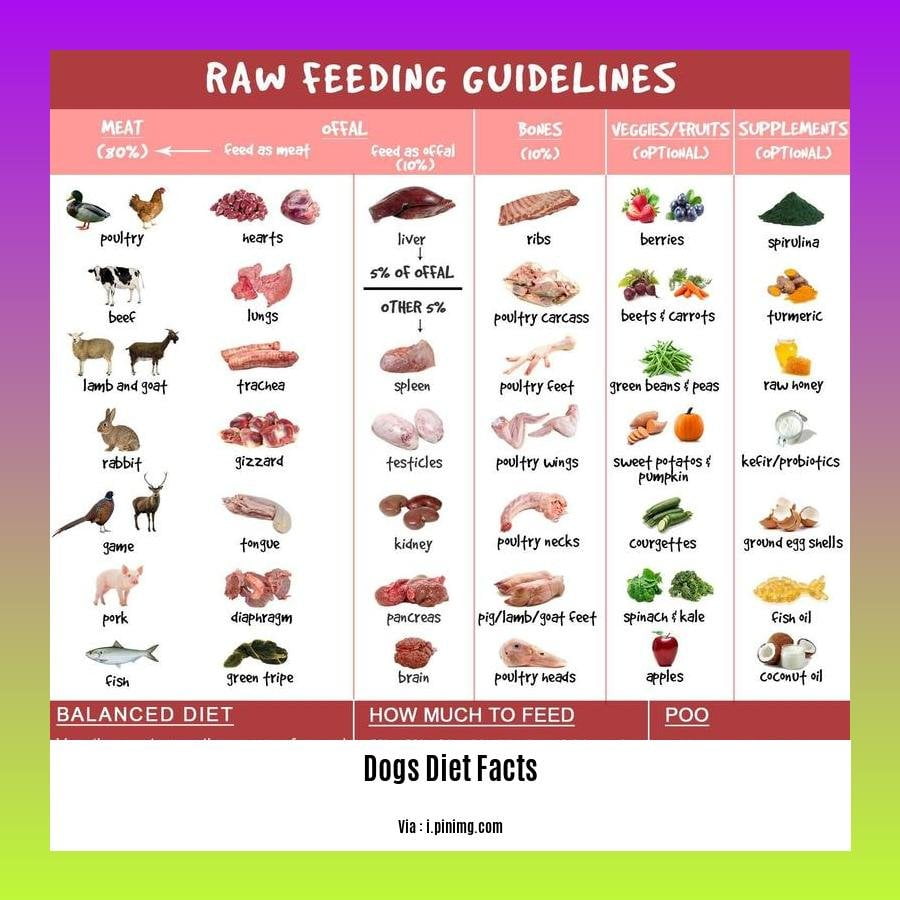Welcome to “Dogs Diet Facts: Debunking Common Misconceptions and Unveiling Essential Nutrients,” your ultimate guide to ensuring optimal nutrition for your furry friend. As pet owners, we all strive to provide our beloved dogs with a balanced and nutritious diet that supports their overall health and well-being. However, with the abundance of information available, it can be challenging to separate fact from fiction when it comes to dog nutrition. In this article, we will debunk common misconceptions surrounding dog diets and shed light on the essential nutrients your canine companion needs for a healthy and thriving life. Let’s dive in and discover the truth behind feeding your furry friend!
Key Takeaways:
- Dogs are primarily carnivores, but some breeds can also consume vegetables and grains.
- Dogs’ dietary requirements are contingent on their size, age, activity level, and environment.
- Dogs should be fed protein-rich, fresh, and high-quality food, while avoiding wheat, preservatives, and meat with the term “meal.”
- Regular washing of dogs’ food and water bowls is imperative to prevent bacteria buildup.
- Certain foods, such as chocolate, grapes, onions, garlic, and xylitol, are toxic to dogs and should not be fed to them.
- Providing dogs with a well-balanced diet tailored to their age, lifestyle, and health requirements is crucial for their overall well-being.
- The quantity of food a dog should consume is determined by their size, energy needs, and the caloric content of the food.
- The digestibility of the protein in dog food can vary, despite having the same percentage on the label.
- The frequency of feeding dogs depends on their specific dietary needs and lifestyle.
Dogs Diet Facts: Debunking Common Misconceptions and Unveiling Essential Nutrients

Introduction:
When it comes to our beloved canines, their diet plays a vital role in their overall health and well-being. However, there are plenty of misconceptions surrounding dogs’ diets. In this article, we will debunk these myths and uncover essential facts about a dog’s diet. By understanding the nutritional needs of your furry friend, you can make informed decisions about their diet and provide them with the best possible care.
The Truth About Dogs’ Dietary Needs
Every dog is unique, and their dietary needs vary based on factors such as their size, age, activity level, and even the temperature they live in. While dogs are primarily carnivores, some breeds can also eat vegetables and grains. However, it’s crucial to ensure that their diet includes a substantial amount of protein-rich, human-grade, and fresh food.
What to Avoid in a Dog’s Diet
To keep your dog healthy and thriving, it’s important to know what foods to avoid. Foods like chocolate, grapes, onions, garlic, and xylitol are toxic and can be harmful to dogs. Additionally, certain ingredients in dog food, such as wheat, preservatives, and meat labeled as “meal,” should be avoided. These substances can lead to allergies, digestive issues, and other health problems.
Dispelling Common Myths
There are several misconceptions surrounding dogs’ diets that need to be debunked. One common myth is that dogs should only eat dry kibble. While dry food can be a convenient option, it’s not the only choice. A balanced diet can also include fresh, natural, and homemade meals, as long as they meet the necessary nutritional requirements.
Another misconception is that all dog foods labeled as “premium” or “natural” are automatically the best choice. However, it’s essential to carefully read the ingredients list and understand what nutrients your dog truly needs. Not all “premium” foods are created equal, and some may contain fillers or unnecessary additives.
Understanding Essential Nutrients
Protein is a crucial nutrient for dogs, as it supports their muscle growth and development. However, it’s important to note that the protein content alone doesn’t tell the whole story. The digestibility of the protein is equally important. Some dog foods may have the same percentage of protein, but their protein sources differ in terms of digestibility, affecting its overall quality.
In addition to protein, dogs require a balanced mix of fats, carbohydrates, vitamins, and minerals in their diet. These nutrients help maintain their overall health and support various bodily functions. By providing your dog with a well-rounded diet that meets their specific needs, you can ensure they are getting all the essential nutrients they require.
Feeding Frequency and Portion Control
The frequency at which you feed your dog depends on their individual dietary needs and lifestyle. Puppies generally require more frequent meals, while adult dogs may benefit from one to two meals per day. It’s important to consult with your veterinarian to determine the best feeding schedule for your furry friend.
Furthermore, portion control is crucial to prevent overfeeding or undernourishment. The amount of food your dog needs depends on their size, energy requirements, and the calorie content of the food. Providing the right portion size can help maintain a healthy weight and prevent obesity-related issues.
Keeping Food and Water Bowls Clean
Maintaining clean food and water bowls is essential for your dog’s health. Bacteria can quickly multiply in dirty bowls, leading to infections and digestive problems. Make it a habit to wash your dog’s food and water bowls regularly with warm, soapy water. This simple practice can help keep your canine companion safe and healthy.
Conclusion
A well-balanced and nutritious diet is vital for the overall health and well-being of our furry friends. By understanding the facts about a dog’s diet and debunking common misconceptions, we can provide our dogs with the best possible nutrition. Remember to consult with your veterinarian to develop a customized meal plan that meets your dog’s specific needs. With proper nutrition, your canine companion will thrive and enjoy a long and happy life.
Drinking water for hair growth can work wonders. See the amazing before and after results by incorporating this simple habit into your routine. drinking water for hair growth before and after
Take up the drinking water for hair growth challenge and witness the transformation yourself. Don’t miss out on this opportunity to achieve healthy and luscious locks. drinking water for hair growth challenge
Did you know that drinking water has fun facts too? Discover interesting and surprising information about the benefits of staying hydrated. drinking water fun facts
Tips for Dog Nutrition

Feed your dog a balanced and nutritious diet
When it comes to your furry friend’s health, a well-balanced and nutritious diet is essential. [Tips for dog nutrition] start with providing your dog with unseasoned, boneless, lean meats, and certain plain fruits and vegetables. Opt for whole, unprocessed foods that are low in fat, salt, and sugar. This will ensure that your dog receives the necessary nutrients for optimal health.
Choose high-quality dog food
With so many options available in the market, it can be overwhelming to choose the right dog food for your canine companion. Therefore, it’s important to discard the marketing hype and take the label test. Look for dog food brands that use real, recognizable, whole-food ingredients. Avoid shelf-stable foods as a staple diet, as they often contain artificial additives and preservatives.
Introduce fresh and varied ingredients
To enhance your dog’s diet, consider introducing fresh whole foods and a variety of ingredients that are rich in antioxidants and anti-inflammatory properties. Certified organic vegetables and fruits are a great option when possible. Remember that cooking meats can reduce their nutritional value, so it’s best to feed them raw or lightly cooked.
Be mindful of portion sizes
Portion control is key to maintaining a healthy weight for your dog. Treats should only make up a small portion of their daily intake, ideally no more than 10 percent. This will help prevent weight gain and associated health issues. Additionally, it’s important to choose a low-calorie diet, especially for adult, indoor, spayed or neutered dogs who have lower energy requirements. The diet should contain fewer than 350 calories per cup.
Avoid common toxic foods
Certain foods can be toxic or harmful to dogs and should be avoided completely. Chocolate, grapes, onions, garlic, and xylitol are just a few examples. These substances can cause severe health problems and, in some cases, even be fatal to our canine friends. It’s always better to be safe than sorry, so be sure to educate yourself about the toxicity of certain foods.
Seek reputable sources for information
It’s important to gather information from reliable sources when it comes to your dog’s health and nutrition. Here are a few trusted websites that provide valuable insights into dog nutrition and diet:
- The Spruce Pets: Dog Food and Basic Feeding Tips
- Dogs Naturally Magazine: 15 Tips To Improve Your Dog’s Diet Today
- VCA Hospitals: Nutrition – General Feeding Guidelines for Dogs
These sources contain additional information that can guide you in making informed choices for your dog’s health and well-being.
Key Takeaways:
– Feed your dog unseasoned, boneless, lean meats and certain plain fruits and vegetables.
– Choose high-quality dog food with real, recognizable, whole-food ingredients.
– Introduce fresh and varied ingredients that are rich in antioxidants and anti-inflammatory properties.
– Be mindful of portion sizes and opt for a low-calorie diet when necessary.
– Avoid feeding your dog toxic foods like chocolate, grapes, onions, garlic, and xylitol.
– Seek information from reputable sources like The Spruce Pets, Dogs Naturally Magazine, and VCA Hospitals.
Citations:
– The Spruce Pets: Dog Food and Basic Feeding Tips
– Dogs Naturally Magazine: 15 Tips To Improve Your Dog’s Diet Today
– VCA Hospitals: Nutrition – General Feeding Guidelines for Dogs
Important Nutrients
When it comes to your dog’s diet, it’s crucial to understand the important nutrients they need to thrive. Providing your canine companion with a well-balanced and nutritious diet is key to their overall health and well-being. In this article, we will explore the essential nutrients that every dog requires.
Water: Hydration is Key
Water is the most important nutrient for dogs. Just like humans, dogs rely on water for hydration and proper bodily functions. They need a specific type of water that is safe and clean. Ensuring that your dog has access to fresh water at all times is vital for their health.
Unlocking the Power of Protein
Next up on our list of important nutrients is protein. Protein is essential for muscle growth and repair in dogs. It plays a crucial role in maintaining their overall health. Dogs can obtain protein from various sources, such as lean meats and eggs. Including protein-rich foods in their diet is essential for their well-being.
The Role of Healthy Fats
Healthy fats are another key nutrient that dogs need. These fats provide energy, support cell function, and aid in the absorption of fat-soluble vitamins. Including sources of healthy fats, such as fish oil or flaxseed oil, in your dog’s diet can have a positive impact on their overall health.
Unlocking the Power of Vitamins
Vitamins are essential for various bodily functions in dogs. Dark, leafy greens are a great source of vitamins for your furry friend. These greens are packed with essential vitamins that can help support your dog’s overall health and well-being.
The Importance of Minerals
Minerals are vital for maintaining bone and teeth health, nerve function, and fluid balance in dogs. It’s crucial to include a proper intake of minerals in your dog’s diet. You can find minerals in foods such as bone broth or certain vegetables.
The Role of Carbohydrates
Lastly, we have carbohydrates. Healthy carbohydrates provide energy and support digestion in dogs. While dogs are primarily carnivores, they can still benefit from a balance of carbohydrates in their diet. Including complex carbohydrates, such as sweet potatoes or whole grains, can be beneficial for their overall health.
Key Takeaways:
- Water is the most important nutrient for dogs, and they require access to fresh water at all times.
- Protein is crucial for muscle growth and repair in dogs, and sources like lean meats and eggs are excellent options.
- Healthy fats play a key role in supporting cell function and energy production in dogs.
- Dogs need a variety of vitamins for their overall health, and dark, leafy greens are a good source.
- Minerals are essential for bone health, nerve function, and fluid balance in dogs.
- Carbohydrates provide energy and support digestion in dogs, and complex carbohydrates like sweet potatoes can be beneficial.
Sources:
– WebMD
– American Kennel Club
FAQ
Q1: Is it true that all dogs are carnivores and should only eat meat?
A1: No, while dogs are mostly carnivores, some breeds are omnivores and can also eat vegetables and grains as part of their diet.
Q2: How often should I feed my dog and what factors should I consider when determining the frequency?
A2: The frequency of feeding dogs depends on their specific dietary needs and lifestyle. Factors such as age, size, activity level, and health condition should be considered when determining how often to feed your dog.
Q3: Can dogs eat fruits and vegetables, and if so, which ones are safe for them?
A3: Yes, dogs can eat certain fruits and vegetables. However, it’s important to feed them plain and unseasoned options. Some safe options include apples, carrots, green beans, and blueberries. It is best to avoid feeding them grapes, onions, garlic, and other toxic foods.
Q4: How do I choose the right dog food for my pet?
A4: When choosing dog food, it’s important to read the labels carefully. Look for protein-rich, human-grade, and fresh food options while avoiding those with preservatives, wheat, and meat labeled as “meal”. You can also refer to reputable sources and conduct research to make informed decisions.
Q5: What are the signs of nutrient deficiency in dogs and how can I ensure they receive all the necessary nutrients?
A5: Signs of nutrient deficiency in dogs may include changes in coat quality, weight loss, decreased energy levels, and other health issues. To ensure your dog receives all the necessary nutrients, provide them with a well-balanced diet that includes protein sources, healthy fats, vitamins, minerals, and carbohydrates. Regular monitoring and consulting with a veterinarian can also help prevent deficiencies.
- SYBAU See You Baby Meaning: Gen Z Slang Evolves - July 1, 2025
- Unlock Your Inner Youth: Lifestyle Secrets for a Vibrant Life - July 1, 2025
- Decode SYBAU Meaning: Gen Z Slang Explained - July 1, 2025






